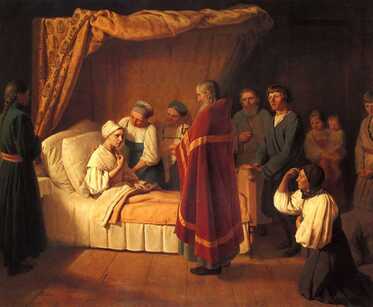If you or a loved one is seriously ill and in need of the Sacrament of the Sick, please contact the parish office.
(559) 673-3290
Emergency Night Call/ Llamadas Nocturnas de Emergencia
For Annointing of the Sick call (559) 507-0893 from 10pm to 5am
Para Uncion de los Enfermos llame al (559) 507-0893 de 10pm a 5am
For Annointing of the Sick call (559) 507-0893 from 10pm to 5am
Para Uncion de los Enfermos llame al (559) 507-0893 de 10pm a 5am
Is anyone among you sick? He should summon the presbyters of the church, and they should pray over him and anoint him with oil in the name of the Lord, and the prayer of faith will save the sick person, and the Lord will raise him up. If he has committed any sins, he will be forgiven."
-James 5:14-15
What is the sacrament of the anointing of the sick?The anointing of the sick is a sacrament of the Church in which the priest prays, lays hands and anoints the sick person with blessed oil. It may be preceded by the sacrament of reconciliation and followed by Eucharist.
|
How often can someone receive the sacrament?The sacrament may be repeated if the recipient suffers from a different illness or injury, or if the same illness or condition becomes more serious. Elderly people may be anointed if they have become weakened even though no serious illness is present.
|
How sick does someone have to be to receive the sacrament?Anyone who is dangerously ill due to sickness, injury or old age may be anointed. The sacrament is for serious mental or emotional illness as well. The rite states clearly that a person should be anointed at the beginning of the illness, or before surgery whenever a serious condition is the reason for the surgery. The anointing may be repeated if the same illness or condition becomes more serious.
|
Can someone be anointed after death?All sacraments of the Church, including the anointing of the sick, are encounters between a living person and God, celebrated within the context of the Christian community. There are specific prayers designed for the commendation of the dead to the mercy of God and for the consolation of the bereaved.
|


